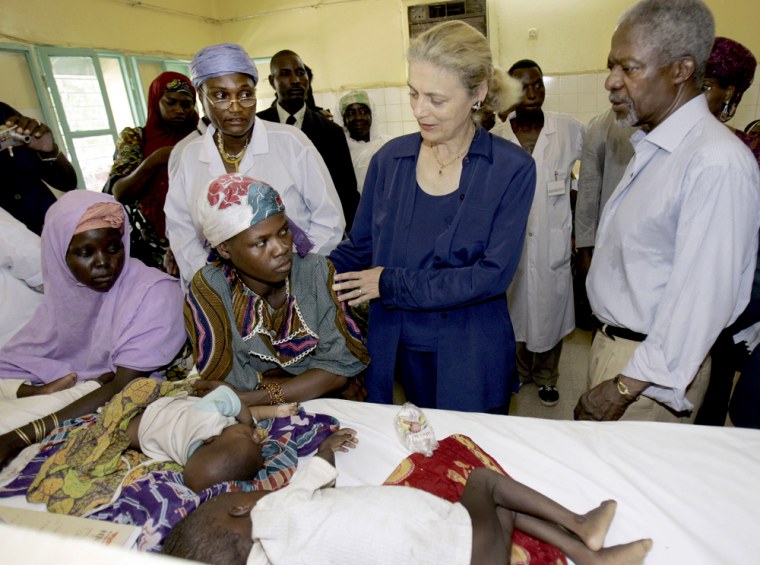U.N. Secretary-General Kofi Annan toured the hunger-stricken desert nation of Niger on Tuesday, and a French aid group criticized the world body for an allegedly slow and “inadequate” response to the crisis.
Annan, whose organization was the first to appeal for help for Niger as far back as November, was on a two-day trip to focus attention on the combined effects of a devastating drought and locust invasion that have struck a swath of northwest Africa and left more than five million people facing severe food shortages.
Annan was welcomed at Zinder airport by President Mamadou Tandja, who has played down the crisis and accused the U.N., aid groups and opposition parties of exaggerating his country’s problems for political and economic gain.
“I came to see myself, to talk to the government, to see what we can do together to improve the situation not only in the short-term, but also in the long-term,” Annan told reporters.
Aid group critical of U.N. response
With an entourage of more than 100 officials and journalists in tow, Annan toured the main hospital in Zinder, where dozens of weak, skeletal children lay in beds, some with IV drips in their arms.
He asked mothers about their children and then visited an emergency feeding center set up by the French aid group Medecins Sans Frontieres (MSF) or Doctors Without Borders. Officials there said 2,354 children had been admitted to the center in the last month.
In a statement on the eve of Annan’s visit, Doctors Without Borders said “the U.N. was slow to react to the current epidemic of acute malnutrition in Niger, and its response continues to be inadequate.”
When asked about the criticism, Annan skirted the question, saying only: “I was very impressed with what MSF is trying to do in Niger.”
Marcus Prior, a U.N. World Food Program official in Niger, expressed surprise at the criticism from Doctors Without Borders.
“We work very closely with them in our operations here and are surprised these concerns weren’t raised in Zinder,” he said. “We need to focus on doing what is most important for the people in Niger, which is rolling out free food distribution in the villages as widely and as quickly as possible.”
Doctors Without Borders, which won the Nobel Peace Prize in 1999 in recognition of its pioneering humanitarian work, is not alone in criticizing the U.N. response to the hunger crisis.
Highlights need for U.N. reform
John O’Shea, chief executive of the Irish aid agency Goal, has questioned whether the U.N. is capable of marshaling international will to respond to such crises. O’Shea called the U.N. “a collection of organizations, some good, some reasonably good, some bureaucratic, some full of corruption, some wasteful. The bottom line is they are not doing the job.”
The British aid agency Oxfam had said the way the hunger crisis has unfolded illustrates a need for U.N. reform, calling for the creation of a $1 billion emergency fund U.N. officials could draw on when they see situations like the one in Niger developing, rather than waiting for the world to respond to its appeals.
An estimated 3.6 million people are facing severe food shortages in Niger alone. The U.N. says at least 1.6 million people in other Sahel countries — Mali, Burkina Faso and Mauritania — are also affected.
Earlier this month, U.N. agencies increased their appeals to a total of $75 million for Niger. The World Food Program more than tripled the amount of emergency aid it’s seeking — from $16 million six months ago to $57.6 million now.
Doctors Without Borders said U.N. food distributions were “not reaching those with the greatest needs, especially children under five years of age in the worst-affected areas.”
It urged Annan “to ensure that U.N. agencies like the World Food Program and UNICEF distribute aid according to the real needs of people.”
“To date, the distributions undertaken by the WFP fall short, in quantity and quality, in responding to the gravity of the current epidemic of acute malnutrition encountered by MSF medical teams in the region,” the statement said.
Problem getting worse
Doctors Without Borders also said the crisis appeared to be deepening in some areas.
On Tuesday, Annan also visited the village of Madara, about 9 miles north of Zinder. Villagers there said they were hungry, and appealed to Annan and the government to keep food aid coming.
The U.N. said ahead of the trip that Annan wanted to show solidarity with Niger as they deal with the aftermath of accelerating desertification, prolonged drought and repeated locust infestations.
U.N. experts, though, have been careful to say that while the situation is serious, it has not yet reached famine proportions.
